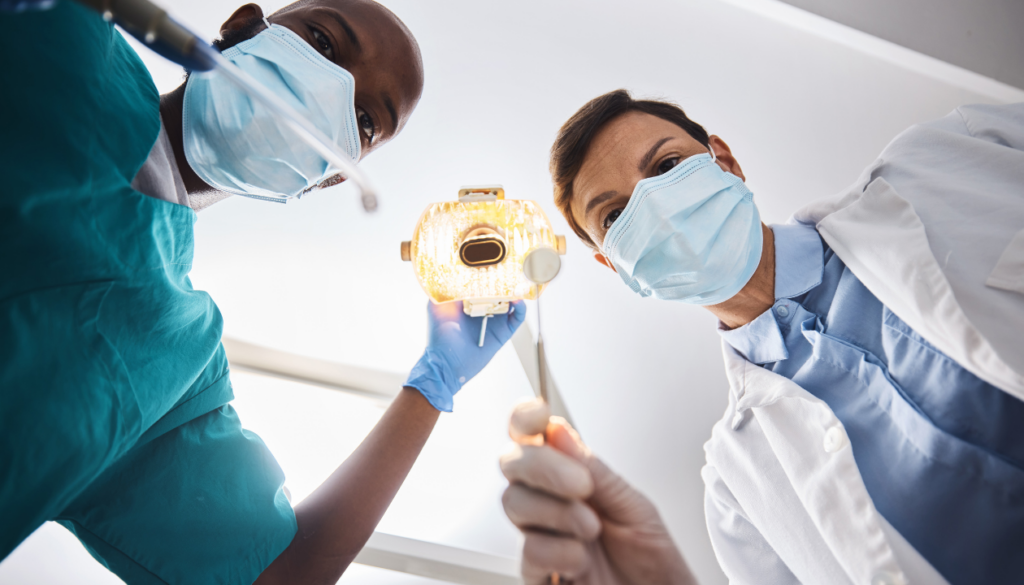When it comes to maintaining your oral health, regular dental cleanings play a vital role. You might wonder how long these appointments take and what to expect during the process.
Understanding the timeline can help you plan your visits and ensure you’re getting the care you need.
Typically, a dental cleaning lasts about 30 to 60 minutes, depending on various factors like the condition of your teeth and any additional treatments required. Knowing this can ease your mind and help you schedule your day better.
Let’s dive into what influences the duration of dental cleanings and how you can make the most of your appointment.
What Is Dental Cleaning?
Dental cleaning, also known as prophylaxis cleaning, focuses on removing plaque and tartar from your teeth. This process helps prevent cavities and gum disease, promoting overall oral health.
During a typical dental cleaning appointment, a dental hygienist or dentist performs several key steps:
- Initial Exam: The service begins with a thorough examination of your teeth and gums to spot issues like plaque buildup, inflammation, or other dental problems.
- X-Rays: While not always included, X-rays are often taken once a year to reveal underlying conditions such as cavities, bone loss, or gum disease.
- Plaque and Tartar Removal: The dental hygienist employs a scaler to eliminate plaque and tartar from your teeth, particularly along the gumline.
Overall, dental cleaning is essential for maintaining a healthy mouth and preventing more serious dental issues in the future.
How Long Does a Dental Cleaning Take?
The duration of a dental cleaning varies based on several factors. Generally, you can expect a routine dental cleaning to take between 30 to 60 minutes.
Average Duration
A routine dental cleaning typically lasts between 30 to 60 minutes.
The cleaning portion averages 30 to 40 minutes, while the entire appointment, including exams and additional procedures, lasts around 45 minutes to 1 hour.
Factors Affecting Duration
- Oral Health: If your teeth are well-maintained, the cleaning may take around 30 minutes. Conversely, significant plaque or tartar buildup can extend the process to closer to 1 hour.
- Presence of Gum Disease or Tartar: Patients with gum disease or extensive tartar buildup require deeper cleaning. This deep cleaning involves scaling and root planing, which can take an hour or more per quadrant of the mouth.
Steps Involved in Dental Cleaning
Dental cleaning consists of several key steps that ensure comprehensive oral health management. Understanding these steps can help you appreciate the process and prepare for your appointment.
Initial Examination
- The dental hygienist starts with an initial oral examination. Using a small mirror, they inspect the inside of your mouth. This examination identifies any issues, such as plaque, tartar, or gum disease, which may require further attention from the dentist.
Cleaning Process
The cleaning process involves several techniques aimed at removing plaque and tartar. The hygienist uses a scaler to eliminate plaque and tartar buildup from teeth, even below the gum line.
Ultrasonic scaling devices may be employed, offering a more comfortable experience compared to traditional methods. This step is crucial for preventing cavities and gum disease.
After cleaning, the dentist performs a final checkup. They review the hygienist’s findings and evaluate your overall oral health.
The dentist may discuss any additional treatments or recommendations based on the condition of your teeth and gums, ensuring comprehensive care tailored to your needs.
Importance of Regular Dental Cleanings
Regular dental cleanings play a crucial role in maintaining your oral health. Consistent cleanings help prevent cavities and gum disease by removing plaque and tartar buildup.
Regular cleanings identify potential dental issues early. Your dental hygienist examines for signs of gum disease, cavities, and other oral health concerns. Early detection often leads to less invasive treatments.
Cleanings promote fresher breath. Removing plaque and tartar reduces bacteria that cause bad breath. Regular cleanings contribute to a cleaner, healthier mouth and enhanced confidence in your breath.
Cleanings can save you money in the long run. Addressing dental problems early prevents the need for extensive treatments that can be costly. Regular maintenance keeps your oral health in check and minimizes future expenses.
Establishing a routine dental cleaning schedule fosters a sense of responsibility for your oral health. By prioritizing cleanings, you encourage good oral hygiene practices at home, such as brushing and flossing regularly.
Conclusion
Regular dental cleanings are vital for your oral health and can easily fit into your schedule. Understanding how long these appointments take helps you plan better and ensures you get the care you need.
Whether it’s a quick 30-minute session or a more extensive cleaning, knowing what to expect can make the process smoother.
By prioritizing these visits, you’re investing in your long-term dental health and preventing potential issues down the line. So keep up with your routine cleanings and enjoy the benefits of a healthier smile and fresher breath.
Frequently Asked Questions
How often should I schedule dental cleanings?
You should schedule dental cleanings every six months for optimal oral health. However, your dentist may recommend more frequent visits based on your individual needs, especially if you have gum disease or a history of dental issues.
What can I expect during a dental cleaning appointment?
During a dental cleaning, you can expect an initial exam, plaque and tartar removal, possible X-rays, and a final check by the dentist. The hygienist will use various tools and techniques to ensure your teeth and gums are healthy.
How long do dental cleanings typically last?
A typical dental cleaning lasts between 30 to 60 minutes. Routine cleanings generally take around 30 to 40 minutes, while more complex cases may require additional time depending on the condition of your teeth.
Is dental cleaning painful?
Dental cleaning is usually not painful. You might feel some discomfort, especially if you have sensitive gums or extensive tartar buildup. Your hygienist can use techniques to minimize discomfort and ensure a gentle experience.
Why are regular dental cleanings important?
Regular dental cleanings help prevent cavities and gum disease, remove plaque and tartar buildup, and catch potential dental issues early. This helps maintain better oral health and can save you money on costly treatments in the future.
Can I skip my dental cleaning if I brush regularly?
No, you should not skip dental cleanings. Even with good brushing habits, plaque can still accumulate and harden into tartar, which only a professional cleaning can remove. Regular visits are essential for maintaining optimal dental health.
Forestwood Dental: Prioritize Your Oral Health with Us Today!
At Forestwood Dental, we are committed to providing exceptional dental care in a welcoming environment. If it’s time for your next cleaning, don’t delay!
Schedule your appointment today to ensure your smile stays healthy and bright. Our professional team is ready to help you maintain optimal oral health with personalized care.
Book now to secure your spot and take the first step toward a healthier smile!

